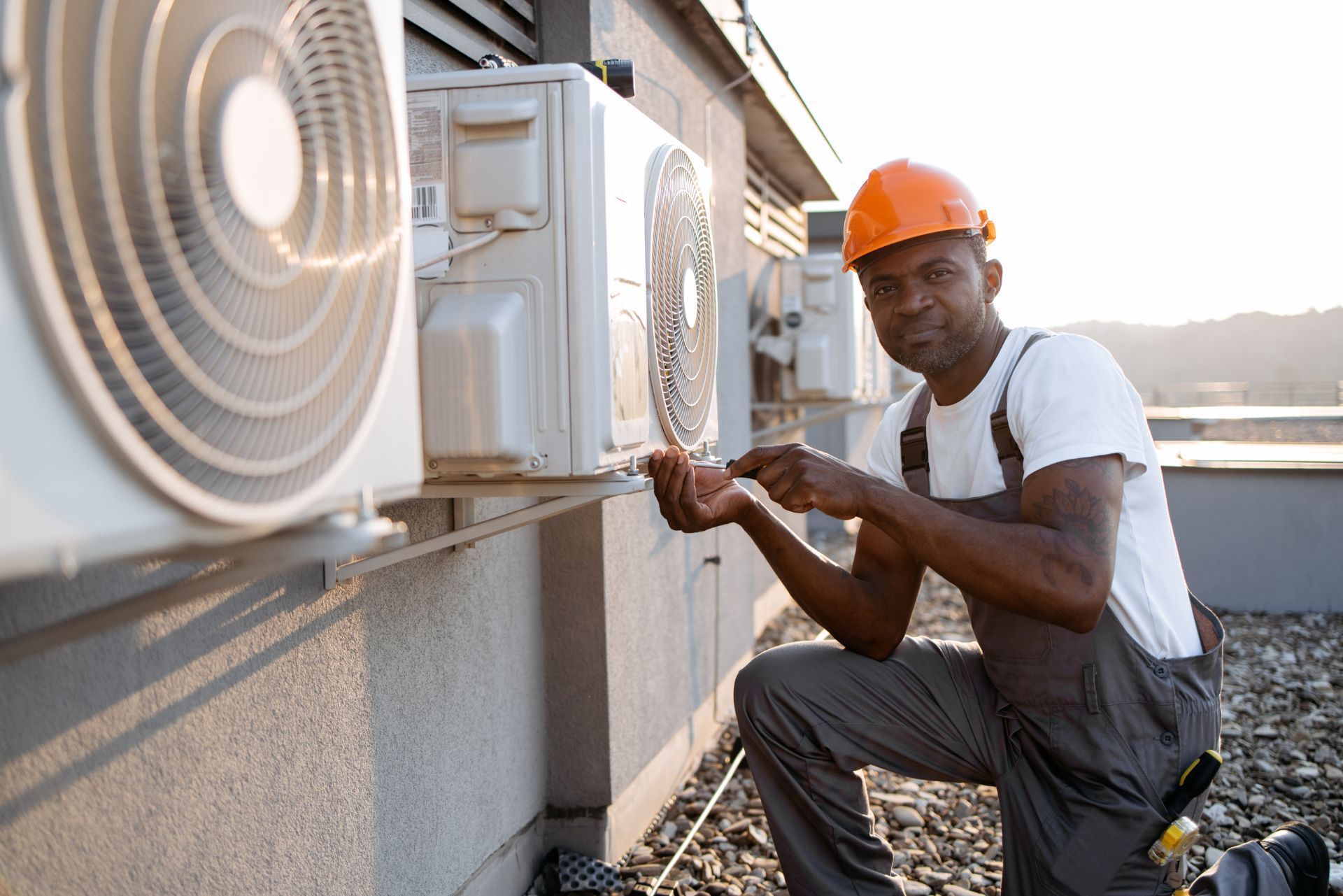Top 3 Recommended Policies

Running an HVAC business in Florida means working in one of the busiest climates in the country. Long cooling seasons, high humidity, and year-round demand for service make the industry both rewarding and unpredictable. Contractors here face constant exposure to equipment damage, liability claims, and storm-related losses, making proper insurance coverage a must for long-term stability. This guide explains how HVAC contractor insurance in Florida works, what types of coverage you should consider, and how local weather and labor trends influence costs. Whether you focus on residential installations or large commercial systems, understanding your insurance options can help you protect your business and stay competitive in Florida’s fast-growing market.
Why Insurance is Critical for Florida HVAC Contractors
Operating as an HVAC contractor in Florida comes with unique challenges. The state’s climate demands constant maintenance and installation of air conditioning and heating systems, increasing the likelihood of workplace accidents and property damage. Insurance is not just a regulatory formality—it’s a vital safety net that protects your business from financial losses stemming from unforeseen events.
One of the most significant concerns for HVAC contractors is workers’ compensation insurance. This coverage provides benefits to employees who suffer job-related injuries or illnesses. However, there is ongoing debate in Florida about the implications of lowering workers’ compensation rates. Lisa Pate, Executive Director of the Florida Roofing and Sheet Metal Contractors Association, has voiced concerns that reduced rates might lead to an influx of inexperienced laborers and potentially higher future claims, which could ultimately increase costs for contractors in the long run.
In addition to workers’ compensation, HVAC contractors should also consider general liability insurance. This type of coverage protects businesses from claims related to bodily injury or property damage that may occur during the course of work. For instance, if a technician accidentally damages a client’s property while installing a new air conditioning unit, general liability insurance can cover the costs of repairs, thereby preventing significant financial strain on the contractor. Moreover, having robust liability coverage can enhance a contractor's reputation, as clients are more likely to trust a business that demonstrates a commitment to protecting both its employees and its customers.
Given these dynamics, it’s crucial for HVAC contractors to carefully assess their insurance needs and work with knowledgeable providers to tailor coverage that fits their specific risks and operational scale. Additionally, staying informed about the latest industry trends and regulatory changes can help contractors make proactive adjustments to their insurance policies. For example, as technology evolves, many HVAC contractors are integrating smart systems into their services, which may require specialized coverage. By understanding these emerging trends, contractors can ensure they are adequately protected against new risks while also positioning themselves as leaders in the industry.

Key Types of Insurance for HVAC Contractors
General Liability Insurance
General liability insurance is fundamental for HVAC contractors. It covers third-party claims related to bodily injury, property damage, and personal injury that might occur during your business operations. For example, if a customer’s property is accidentally damaged during an installation, this insurance helps cover repair costs and legal fees.
Without general liability insurance, contractors risk facing costly lawsuits that can jeopardize their financial stability. Considering Florida’s active litigation environment, securing robust liability coverage is a wise investment. Additionally, many clients now require proof of general liability insurance before hiring a contractor, making it not only a safeguard for your business but also a competitive advantage in securing contracts.
Moreover, general liability insurance can also cover incidents that occur off-site, such as during a consultation or while transporting equipment. This comprehensive coverage ensures that contractors are protected against a wide range of potential liabilities, allowing them to focus on their work without the constant worry of unforeseen legal issues.
Workers’ Compensation Insurance
As mentioned earlier, workers’ compensation insurance is mandatory for most Florida businesses with employees. It covers medical expenses and lost wages for workers injured on the job. Despite debates about rate adjustments, this insurance remains a non-negotiable aspect of responsible business management.
Reducing workers’ compensation rates might seem beneficial initially, but experts warn it could encourage less experienced workers to enter the field, potentially increasing accident rates. This makes it even more important for contractors to maintain strict safety protocols and adequate insurance coverage. Investing in safety training and equipment can not only lower the likelihood of accidents but may also lead to lower insurance premiums over time.
Furthermore, having a solid workers’ compensation policy can enhance employee morale and retention. Workers who know they are protected in the event of an injury are more likely to feel secure in their positions, fostering a positive work environment that can lead to increased productivity and loyalty to the company.
Commercial Auto Insurance
Many HVAC contractors rely on company vehicles to transport equipment and personnel. Commercial auto insurance protects these vehicles against accidents, theft, and damage. It also covers liability if an employee causes injury or property damage while driving a company vehicle.
Given the extensive travel involved in servicing clients across Florida, this coverage is essential to mitigate risks on the road. Additionally, commercial auto insurance can provide coverage for rental vehicles when contractors need to temporarily replace a damaged vehicle, ensuring that business operations continue smoothly without interruption.
Moreover, many policies offer additional features, such as roadside assistance and coverage for tools and equipment stored in the vehicle. This can be invaluable for HVAC contractors who often work in remote locations and need to ensure that they are prepared for any situation that may arise while on the job.
Tools and Equipment Insurance
HVAC contractors invest heavily in specialized tools and equipment. This insurance protects against loss, theft, or damage to these assets, ensuring that a single incident doesn’t disrupt business operations. Considering the high cost of HVAC tools, this coverage provides peace of mind and financial protection.
In addition to protecting against theft or damage, tools and equipment insurance can also cover the costs of renting replacement equipment while repairs are being made. This feature can be particularly beneficial during peak seasons when downtime can lead to lost revenue and dissatisfied customers.
Furthermore, as technology continues to evolve, HVAC contractors are increasingly using advanced tools and smart equipment that require significant investment. Ensuring that these assets are adequately insured not only protects the contractor's financial interests but also supports the ability to offer the latest and most efficient services to clients, enhancing overall business reputation and customer satisfaction.
Impact of Legislative Changes on Insurance and Litigation
Florida’s property insurance market has undergone significant reforms in recent years, which also affect HVAC contractors indirectly. Legislative changes passed in 2022 and 2023, including the removal of assignment of benefits provisions, have helped stabilize the insurance environment by reducing fraudulent claims and litigation abuse. These reforms have contributed to a notable decrease in Florida’s defense and cost-containment expense ratio, which fell from 8.4 in 2022 to 3.1 in 2024, signaling lower litigation-related costs.
Mark Friedlander, spokesperson for the Insurance Information Institute, highlights that Florida residents and businesses are now better positioned due to these legislative efforts that curbed legal system abuse. For HVAC contractors, this means a more predictable insurance market and potentially lower premiums over time.
However, it’s important to stay informed about ongoing regulatory changes, as the insurance landscape continues to evolve in response to market conditions and legal reforms. For more on Florida’s insurance market improvements, see the Florida Surplus Lines Association report.
In addition to the immediate benefits of reduced litigation costs, these legislative changes are expected to foster a more competitive insurance market in Florida. As insurers regain confidence in the stability of the legal environment, they may be more inclined to offer innovative products and coverage options tailored to the unique needs of Florida homeowners and businesses. This could lead to enhanced services and potentially lower rates for HVAC contractors, who often rely on comprehensive insurance to protect their operations and clients.
Moreover, the reforms have sparked a broader discussion about the importance of consumer education in the insurance process. With the complexities of property insurance and the implications of legislative changes, it is crucial for contractors and homeowners alike to understand their rights and responsibilities. Workshops and seminars focusing on insurance literacy could empower stakeholders to make informed decisions, ultimately leading to a healthier market where both consumers and businesses can thrive.
How Digital Innovation is Shaping the HVAC Industry and Insurance Needs
The HVAC industry in Florida is not just growing in size but also evolving technologically. A recent analysis of over 250 Florida HVAC contractors showed that businesses embracing digital marketing and smart technology solutions experienced an average revenue growth of 89%. This remarkable figure underscores the importance of innovation in gaining a competitive edge.
Smart technology integration—such as IoT-enabled HVAC systems and automated maintenance scheduling—not only enhances service quality but also influences insurance considerations. For example, contractors using advanced diagnostic tools may reduce the risk of installation errors and equipment failures, potentially lowering insurance claims and premiums.
Moreover, digital marketing helps contractors reach more customers and build stronger brand reputations, which indirectly supports better risk management by attracting reliable clients and fostering transparent communication.
In addition to these advancements, the rise of data analytics in the HVAC sector is revolutionizing how contractors approach customer service and operational efficiency. By analyzing customer usage patterns and preferences, HVAC companies can tailor their services to meet specific needs, leading to increased customer satisfaction and loyalty. This data-driven approach not only enhances service delivery but also provides valuable insights that can inform insurance underwriting processes, as insurers can better assess risk based on historical performance data.
Furthermore, the integration of mobile applications has empowered both contractors and customers to engage in real-time communication. Customers can schedule appointments, track service history, and even receive reminders for maintenance checks through user-friendly apps. This level of engagement not only improves customer experience but also allows contractors to maintain a proactive stance in their service offerings, thereby minimizing the likelihood of unexpected breakdowns and the associated insurance claims. As the HVAC landscape continues to evolve, these digital tools will play a crucial role in shaping the future of the industry.
For further insights into the impact of technology on Florida’s HVAC market, visit ACFixFinder’s detailed study.

Insurance Challenges Facing Florida HVAC Contractors
Despite the positive trends, Florida HVAC contractors face several insurance-related challenges. One notable issue is the rising number of insurance claim disputes among homeowners. In 2024, nearly 13% of Florida homeowners whose claims were denied proceeded to sue their insurance companies, a slight increase from 12.4% in 2022. This growing litigious environment can indirectly affect contractors, especially when insurance claims involve HVAC system failures or installation defects. The repercussions of these disputes can lead to increased scrutiny of contractors' work, as homeowners may be more inclined to seek legal recourse when they feel their investments are at risk. This can create a ripple effect, leading to heightened tensions between contractors and clients, and potentially damaging reputations in a competitive market.
Contractors must therefore ensure that their work complies with industry standards and maintain thorough documentation to defend against potential liability claims. Additionally, choosing insurance policies with appropriate coverage limits and legal support provisions is critical. The complexity of Florida's insurance landscape, characterized by a myriad of policies and regulations, means that contractors must stay informed about changes that could impact their coverage. This includes understanding the nuances of liability insurance, which can vary significantly between providers and may include specific exclusions that could leave contractors vulnerable in the event of a claim.
Another challenge is balancing insurance costs with competitive pricing. While lowering workers’ compensation rates might seem attractive, experts warn about the trade-offs in workforce quality and long-term claim risks. As Lisa Pate cautions, reducing these rates could lead to more inexperienced laborers, increasing the likelihood of accidents and future insurance claims. Moreover, the pressure to keep costs low can lead contractors to cut corners on safety training and equipment, further exacerbating the risk of workplace incidents. In an industry where safety is paramount, the implications of such decisions can be dire, not only affecting the contractors' bottom line but also the well-being of their employees and clients.
Furthermore, the unpredictable nature of Florida's weather poses its own set of insurance challenges. With hurricanes and tropical storms becoming more frequent, HVAC systems are often put to the test, leading to increased wear and tear. This can result in more claims for damages, which in turn can raise insurance premiums for contractors. The need for robust, weather-resistant installations becomes critical, as contractors must not only meet current building codes but also anticipate future climate-related challenges. As the industry evolves, staying ahead of these trends and ensuring that installations are resilient can help mitigate risks and potentially lower insurance costs over time.
Choosing the Right Insurance Provider and Policy
Selecting the right insurance provider is as important as choosing the right coverage. Contractors should look for insurers with expertise in the HVAC sector and a strong track record in Florida’s market. Providers that understand local regulations, climate risks, and industry-specific challenges can offer tailored solutions that better protect your business.
When evaluating policies, consider the following:
- Coverage Limits: Ensure limits are sufficient to cover potential claims, including property damage, bodily injury, and legal costs.
- Exclusions: Review policy exclusions carefully to avoid unexpected gaps in coverage.
- Claims Support: Choose insurers known for responsive and fair claims handling.
- Cost vs. Value: Don’t base decisions solely on price; comprehensive coverage often saves money in the long run.
Working with an insurance broker who specializes in construction or HVAC insurance can help navigate these complexities and secure the best policy for your needs.
Conclusion: Protecting Your HVAC Business in Florida
Florida’s HVAC industry offers tremendous growth opportunities but also presents significant risks that require careful insurance planning. From mandatory workers’ compensation to general liability and commercial auto insurance, contractors must build a robust insurance portfolio to safeguard their operations.
Legislative reforms and technological advancements are reshaping the insurance landscape, offering both challenges and opportunities. Staying informed about market trends, regulatory changes, and innovative solutions is key to maintaining a resilient business.
For HVAC contractors seeking to thrive in Florida’s dynamic market, investing in the right insurance coverage is not just prudent—it’s essential. Learn more about the state’s HVAC market and insurance environment through trusted sources such as the
IBISWorld industry report and expert insights from the
Insurance Information Institute.
Contact Us
HVACInsure is fully licensed and permitted to sell contractor and commercial insurance in Florida.
We proudly serve clients throughout Florida and maintain partnerships with local Florida insurance carriers to ensure HVAC professionals receive compliant, affordable, and comprehensive coverage that meets project and regulatory requirements.
HVACInsure Focuses on Florida HVAC Contractor Insurance
Jacksonville – Miami – Tampa – Orlando – St. Petersburg – Hialeah – Port St. Lucie – Cape Coral – Tallahassee – Fort Lauderdale – Pembroke Pines – Hollywood – Miramar – Gainesville – Coral Springs – Clearwater – Miami Gardens – Palm Bay – Pompano Beach – West Palm Beach – Lakeland – Davie – Boca Raton – Sunrise – Deltona
Frequently Asked Question
Common HVAC Contractor Insurance Questions in Florida
These FAQs address common contractor questions. As HVACInsure grows, we will update this section with real client experiences and answers.
How does Florida's hurricane season affect my HVAC insurance?
Hurricane season means surge demand and emergency work. We cover the liability of rapid repairs, temporary installations, and the chaos that follows major storms.
What coverage do I need for high-humidity HVAC challenges?
Florida's humidity makes proper sizing and drainage critical. We cover mold liability, moisture damage claims, and IAQ issues that arise from humidity problems.
Do Florida's licensing requirements affect my insurance needs?
Florida requires state certification for HVAC contractors. We ensure your insurance meets DBPR requirements and provide certificates for license maintenance.
What about coverage for vacation rental and hotel HVAC work?
Tourism drives Florida's economy. We cover the quick-response requirements and liability exposure of keeping vacation properties comfortable.
How do I handle coverage for both AC-dominated work?
Florida is 95% cooling. We understand the state's unique market and don't overcharge for heating coverage you'll rarely need.
Can I get coverage for marine and boat HVAC systems?
Marine HVAC is big in Florida. We can cover yacht and boat air conditioning work, including the unique liability of working on vessels.

Still have questions?
Can’t find the answer you’re looking for? Please chat to our friendly team!

About The Author: James Jenkins
I’m James Jenkins, Founder and CEO of HVACInsure. I work with HVAC contractors and related trades to simplify insurance and make coverage easier to understand. Every day, I help business owners secure reliable protection, issue certificates quickly, and stay compliant so their teams can keep working safely and confidently.
Recognized by National HVAC Trade Associations
These trusted organizations set best practices and standards that carriers rely on when underwriting HVAC risks.
Membership signifies adherence to HVAC industry standards and contractor best practices.


